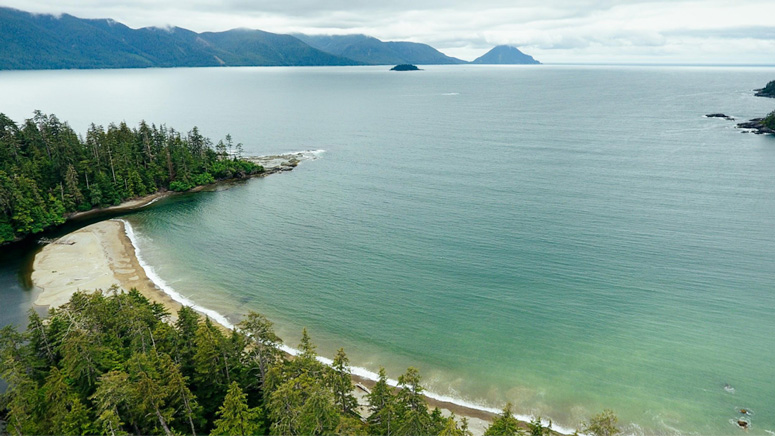Naikoon Contracting Ltd was formed 40 years ago in 1980 in Massett, Haida Gwaii, British Columbia.
To commemorate the landmark occasion, we sat down for a chat with Terry Geluch, the original founder of the company and—as it happens—father to the current company owner, Joe. Terry spoke to us from his home in Masset.
How did it all begin in 1980? Did you have a founding client?
T: I started out as a carpenter by trade and ended up on Haida Gwaii as a shop teacher, but didn’t like it, so after a year, I quit. For a short time after this I didn’t have any work, so I went back to carpentry and started out doing small jobs and whatnot. After a while that ballooned into doing government and military contracts. There was a military base here and they always had capital projects ongoing and lots of maintenance. There were around 200 military personnel working on Haida Gwaii, so there was always plenty of military work to do and gradually we moved into doing First Nations housing projects via the government. We were doing roughly 20 houses a year, so with all of the other stuff that we were doing, the business just kept getting bigger and bigger and bigger. Along with that increase in size there were more headaches of course, because of the isolation and the logistics of getting sub-trades and materials here. We eventually expanded over to the mainland and did quite a bit of work in Terrace, Kitimat and up the Nass Valley. I had an office in Kitimat for a few years, but I found myself in an airplane most of the time, so after a while of doing that, I decided to go back to my roots and moved back to working from the Island full time.
So, did you delegate the travelling aspect of the job to one of your team?
T: I had one major employee called Orlando that looked after the North Coast for me. He would come back and forth to the island for me, so he was a great asset. Then there was Joe and his brother Tony, who basically grew up in construction. Joe started with me when he was six years old and I could see the potential he had in him from a very young age. He was always keen, and a go-getter and always wanted to learn. Over the years I always made sure that I put him with my best carpenters, you know, so I knew that he was working with the very best that I had. He was a very keen and learned kid, so the guys liked him for that alone, even though he didn’t have all of the skills at that time. They took him under their wing, because of that willingness to learn. I have a long list of people that I’ve worked with and appreciated what they did for the company. I always had the philosophy of treating people fair… more than fair… and it paid off in terms of loyalty and allegiance and whatnot.
I suppose that philosophy was of particular importance since you were based in such a remote location?
T: Yes, and I think that’s reflective of how Joe runs the company today. He certainly surrounds himself with good people. I told him from a young age that “you’re only as good as the people that you’ve got working with you.” That’s the road to success, you know. If you have good people and loyal people and you look after them and reward them appropriately then that’s a recipe for success and Joe has done that, he’s carried that out very well.
How many staff did you have on the payroll throughout the years?
T: Well, at one time we had 22 carpenters and plenty of labourers and we were very involved in working with the different First Nations bands in terms of sending people on apprenticeships and training them. It was a win-win situation for both us and the different band councils, in the sense that they got trained professionals at the end of four years. We really focussed on training and securing good people. I think that was the most important aspect of our business, in making sure that we had a good supply of people to work and we would always pay well, so everyone was happy.
So how did you go about establishing strong relationships with architects and other clients back in those days?
T: We established great a rapport with architects, engineers and government bureaucrats over the years… for instance, architects would ask us if we’d be interested in bidding on jobs in the mainland, because they were really happy with our work and professionalism. They knew that we were easy to get along with and would deliver the goods, right. We would always treat them right, it wasn’t just that they stayed in their hotel room when they came up here. Every time they came we wined and dined them. We always made sure we had some good scotch and some good wine and when they left, they went away with a big box of salmon, crab and halibut and so on. They loved it!
Do you miss those old days?
T: Well, I often have told friends, I don’t know how the hell I ever pulled this off! I really don’t. I mean I used to work like 16-18 hours a day, seven days a week for years on end! I look back and I say, ‘Could I ever do this again?’ and I really think no! I don’t even know how I did it. I had Joe and Tony who would come up in the summer and I would always make sure I took the time to teach them how to use a firearm, or go fishing, crabbing or digging for clams so it wasn’t always construction you know. We’d play card games and have friends over all the time. It was always a fun house when they were here, lots of laughter and so many wonderful and different characters lived around here, you know… and still live here. So many salt of the earth people, the sort that would give you the shirt off their back in terms of helping you out.
You mentioned that there were a lot of characters around in those days, do you still keep in touch with some of the folks from the old days of Naikoon?
T: Unfortunately a lot of them have passed away or have gotten old, and getting old sucks! But I do keep in touch with some of those folks, sure. A lot of my friends are fishermen, so there was always an abundance of fresh fish and you know, I’d go deer hunting with buddies, so there was never a shortage of food. I liked to garden, so I had a huge vegetable garden growing copious amounts of peppers and tomatoes and cucumbers and I always made sure I grew more than I would ever need, so that I always had something to give back to whoever would bring round fish or seafood or whatever. So it was sort of like an endless supply, like a chain right. And that probably gave me more satisfaction than anything, that sharing, caring way of life.
Most businesses, when they start out, don’t last more than two or three years… but we’ve made it to 40. I know Joe can keep it going. —Terry Geluch
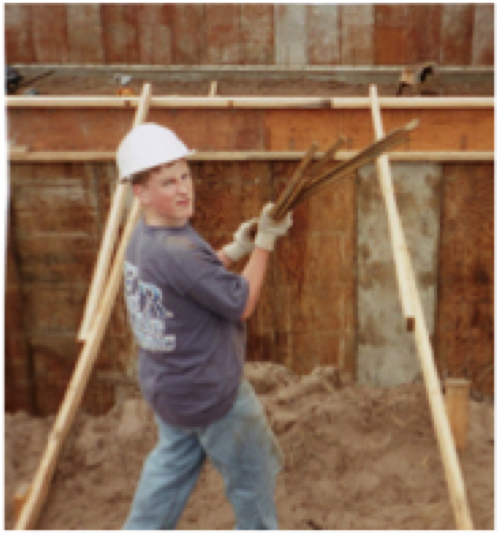
Young Joe working on Haida Gwaii
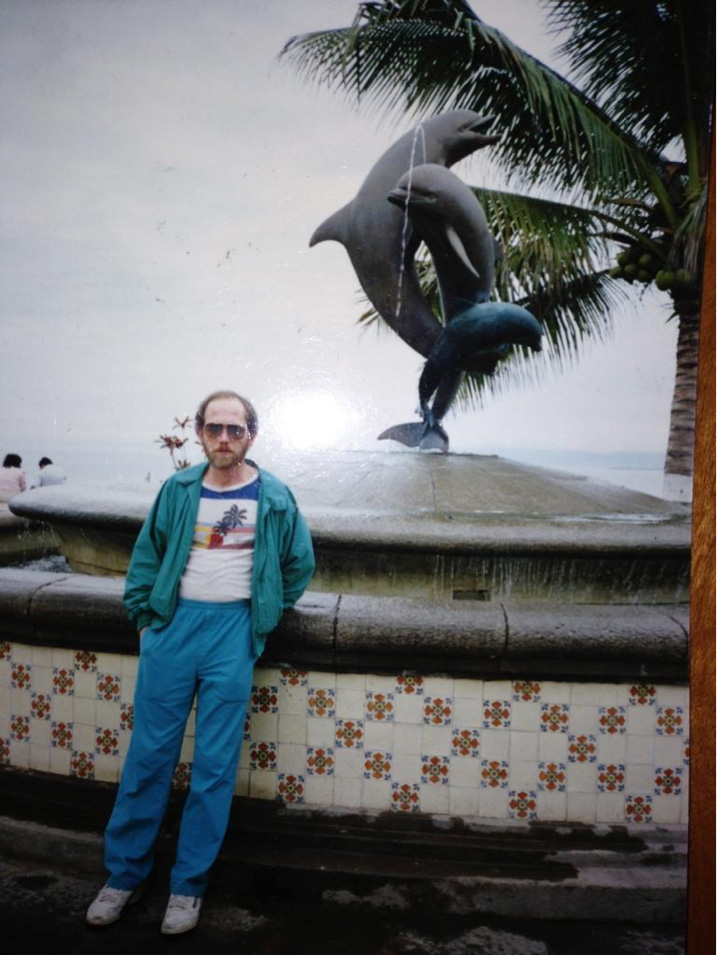
Terry Geluch
So did you get to meet some of the guys that work with Naikoon now?
T: Plenty of the guys have been through here. Ryan lived here with me for 18 months while he was working up here and we’d always cook nice food and I’d have my friends from around here come over.
Were there any stand out funny moments from the original Naikoon days?
T: There were just so many good people and happy times on the job, that made going to work a pleasure. I never regretted going to work every day, never regretted it.
I can remember that there were two guys that came here, over to Massett, while I was building one of my shops. They were standing outside looking and I came over and said, “Hey, where are you guys from?” and it just so happened they were English guys from Newfoundland, who were visiting an uncle out on the military base at that time. We started talking and I couldn’t understand what they were talking about and it took me a while to tune in with their accents! They were hilarious guys though. One of them was an apprentice carpenter, so I said, “Well are you looking for work?” and he said “We’re just visiting, so I don’t have any tools.” So I told him that I had an extra belt, extra square, extra hammer, and all the rest. Anyway, he ended up staying and working with us for 10-15 years! And the other guy stayed too and started a fish farm.
Was there anything else you’d like to add?
T: It’s nice to see how the Naikoon business has been taken to another level, winning so many awards. Technology has changed so much, so I wouldn’t have been able to do the things they do now back in those days, and it’s just great to see. They’ve established a really niche market and I’m really proud of all the accolades, which are now coming in on a national level.
Like I said, if you surround yourself with good people, diligent people, loyal people, the road to success becomes that much more simple. If you can go to work everyday and do your thing and it doesn’t feel like work, then you’ve made it.
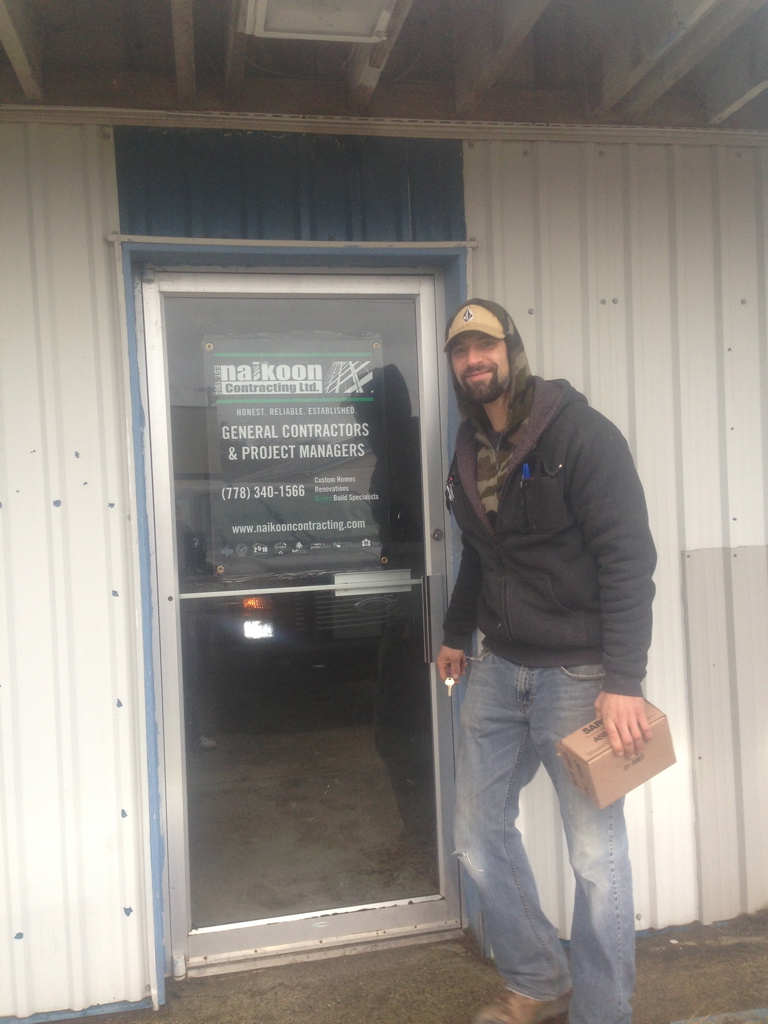
Naikoon’s longest employee, Ryan at the old Naikoon front door in Masset
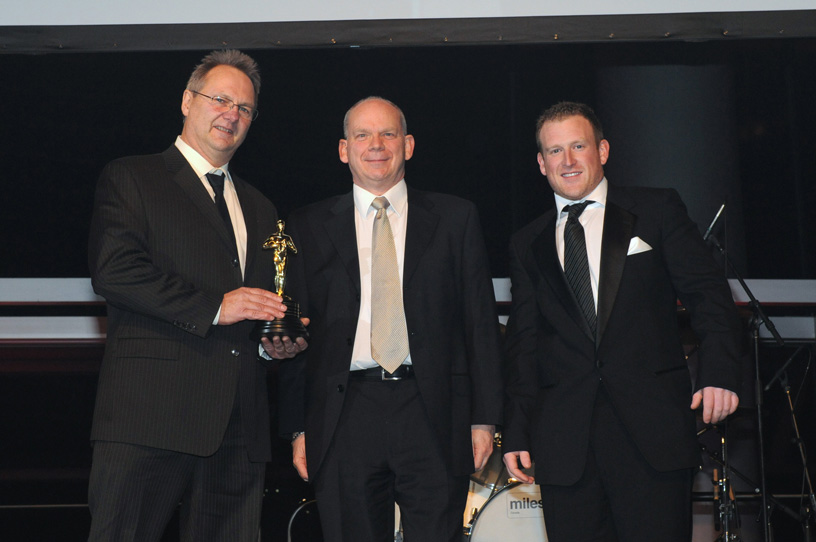
Joe (right) accepting the first Georgie award for Naikoon Contracting.
Thank you, Terry, for sitting down with us and sharing your memories.
On the occasion of our 40th anniversary, we are so grateful to every client and architect we’ve had the opportunity to work with, and all of the amazing industry professionals, consultants, engineers, and sub trades that’ve helped us succeed. We’d especially like to thank our amazing employees who have been working so hard to build the company up to where it is today.
We wish we could throw a huge party to celebrate our 40 year anniversary, but as it is unfortunately not possible right now, but we promise we’ll do it as soon as it is safe again!
